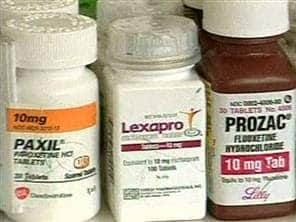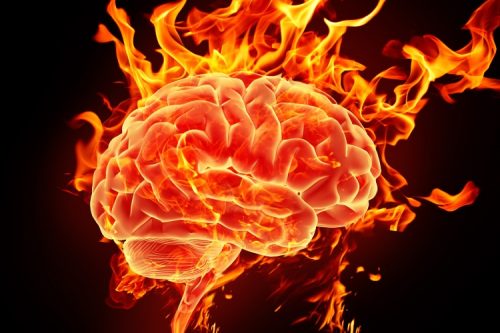Introduction:
If you think that more people are anxious and depressed than before the pandemic, you would be correct:

Data from the US Census Bureau in December reported more than 43% of those surveyed had symptoms of anxiety or depression in December of 2020. The previous year this number was only 11%. Other surveys show worldwide numbers similar to those in the US.
And this makes sense: We’ve been worried about our health and the health of those we love. Our lives have been disrupted and put on hold. We’ve been isolated, and we can’t do many things that are important to us.
There May Be An Additional Reason for the Anxiety
Recent studies (a lot of them) are showing that:
Anxiety and depression are partly caused by inflammation in the brain.
A big reason for this (as with most inflammation) is often a dysfunctional gut.
Another way inflammation is created is by eating inflammatory foods.
I would guess that most of us have been trapped at home binging on sugar, junk food, alcohol, and carbs: the most inflammatory foods in existence.
Gut dysfunction is at epidemic levels in the US. I can’t remember a new patient in the past ten years that hasn’t suffered to some degree from this.
Pandemic Stress + Inflammatory Junk Food + Alcohol + Gut Dysfunction =
Increase in Overall Inflammation and (Often) an Increase in Anxiety & Depression
The Gut-Brain Connection
The connection between your gut and your brain is a vital part of your physical and mental wellbeing. Many studies support this fact, and the gut-brain connection continues to be intensively researched.
At the clinic, we have helped thousands of patients to reduce the inflammation and stress in their bodies, resulting in healthier, happier, calmer, and more productive people.
Reducing your inflammation benefits every part of your body!
If you are dealing with mental stress, make sure you resolve any problems with your gut-brain connection. It can make all the difference!
Dr. Melodie Billiot

Dr. Melodie Billiot
Anxiety and Depression-Brain On Fire?
Ronald Grisanti D.C., D.A.B.C.O., DACBN, MS, CFMP
Depression, Anxiety, and other mental disorders have reached epidemic proportions.
In the US, the national rate of anxiety in 2019 tripled from 8.1% to 25.5%, and depression almost quadrupled from 6.5% to 24.3%.
What is going on?
The present paradigm of treating these mental disorders lies in balancing the neurotransmitters through pharmaceutical agents like SSRIs (Zoloft, Lexapro, Prozac, etc.) and Benzodiazepines (Ativan, Xanax, Valium, and Klonopin. 
Unfortunately, it may just be possible that the neurotransmitter paradigm is antiquated and does not address the underlying root cause(s) of these mental disorders.
After reading and researching, and doing a deep dive into these mental disorders’ possible root causes, I found something amazing and life-changing!
What I discovered was while nutrient deficiencies do play a role, the major eye-opener was the fact that depression, anxiety, and other mental disorders are largely inflammatory in nature.
In the brains of people suffering from depression, anxiety, and many other mental health challenges, the immune system is activated with evidence for elevated levels of inflammatory cytokines such as interleukin 6 and tumor necrosis factor-alpha.
Like rheumatoid arthritis and Crohn’s disease represent inflammation in the joints and gut, psychiatric disorders are linked to inflammation in the brain.
If we hope to gain any control over these mental issues, we must address quenching the brain’s inflammation.
Now here is what I found quite shocking.
Benzodiazepines and SSRIs have another mechanism of function most people are not aware of.
Guess what it is?
They both have anti-inflammatory properties.
Yes that is correct.
Is it possible that these psychiatric medications have little to do with balancing neurotransmitters and more to do with reducing the inflammation in the brain?
The medical literature tends to support this theory.
Now to control this inflammation, one need not look any further than the gut.
Once the gut inflammation takes hold, cytokines circulate throughout the body, including into the brain.
The secret to reducing gastrointestinal inflammation is to identify food irritants, bacterial pathogens and improve optimal microbial flora. Some studies have found that the probiotic, Lactobacillus (L.) rhamnosus has some promise in reducing anxiety and improving microbial flora.
Overall, a picture of the gut microbiome playing a facilitating role between stress response, inflammation, and depression and anxiety is emerging and should be considered with anyone suffering from anxiety, depression, and in that case, any mental disorder.
This new and emerging treatment for anxiety, depression, and other psychiatric disorders is complex but promising!
Although a 180-degree approach to the neurotransmitter deficiency theory, it is worth considering and even embracing.
Compliments from Functional Medicine University
References:
https://www.ncbi.nlm.nih.gov/pmc/articles/PMC4361085/
https://pubmed.ncbi.nlm.nih.gov/20227485/
https://www.ncbi.nlm.nih.gov/pmc/articles/PMC5997866/
https://pubmed.ncbi.nlm.nih.gov/22814704/
https://pubmed.ncbi.nlm.nih.gov/31163212/
https://www.sciencedirect.com/science/article/abs/pii/S0889159112000025
https://europepmc.org/article/med/28342944
https://journals.sagepub.com/doi/full/10.1177/0269881117711708
https://pubmed.ncbi.nlm.nih.gov/11080527/
https://pubmed.ncbi.nlm.nih.gov/11394936/
benzodiazepine anti-inflammatory
https://pubmed.ncbi.nlm.nih.gov/31144383/
https://www.sciencedaily.com/releases/2019/05/190520190110.htm
https://www.ncbi.nlm.nih.gov/pmc/articles/PMC5641835/
Do you have severe, long-term, or frustrating health problems?
- Are you exhausted, depressed, anxious, or unable to sleep?
- Do you feel anxious, depressed or overwhelmed?
- Do you have digestive disturbances, joint pain, headaches, hair loss and weight gain?
Do you wonder how you got here? One day you woke up in a complete mess, but can’t for the life of you figure out how it happened?
It’s not your fault, but you CAN fix it.
Here is a way you can start to get your life back—with energy and vitality no matter the stage of your life.
Dr. Melodie Billiot is a doctor who has lived through her own exhaustion and illness, and discovered the answers to her own health.

As a result, she has helped thousands of people just like you to regain their health.
Get Started: Do a complimentary Health Analysis and Consultation
Blog Subscription
Get Great Information about your Health
- Weekly blog posts with vital tips and warnings
- Interesting “pass it along” health facts
- Cutting edge natural healing techniques and advice

Watch this video for a seven-minute explanation of how your body can be assisted to heal itself.

